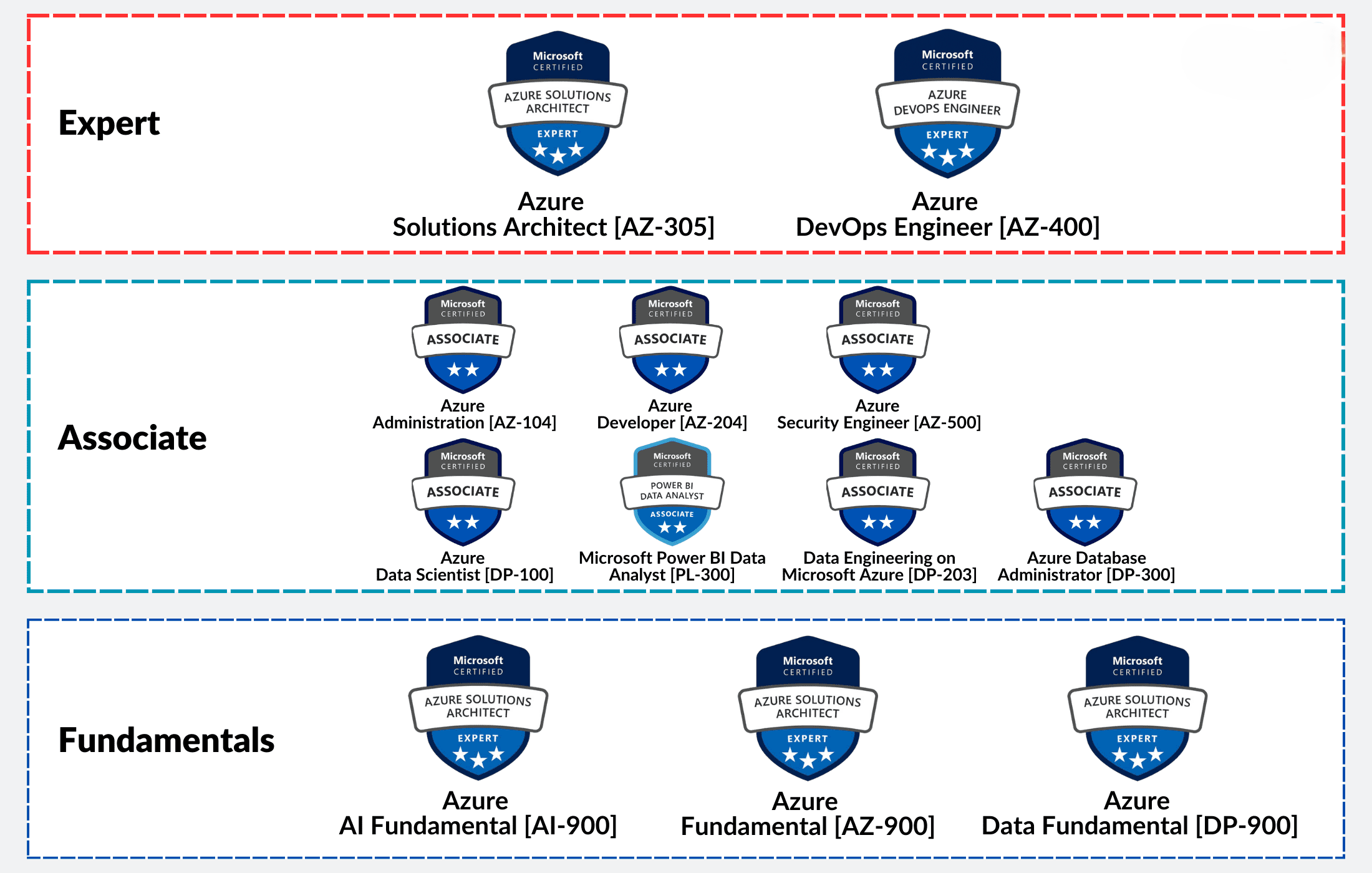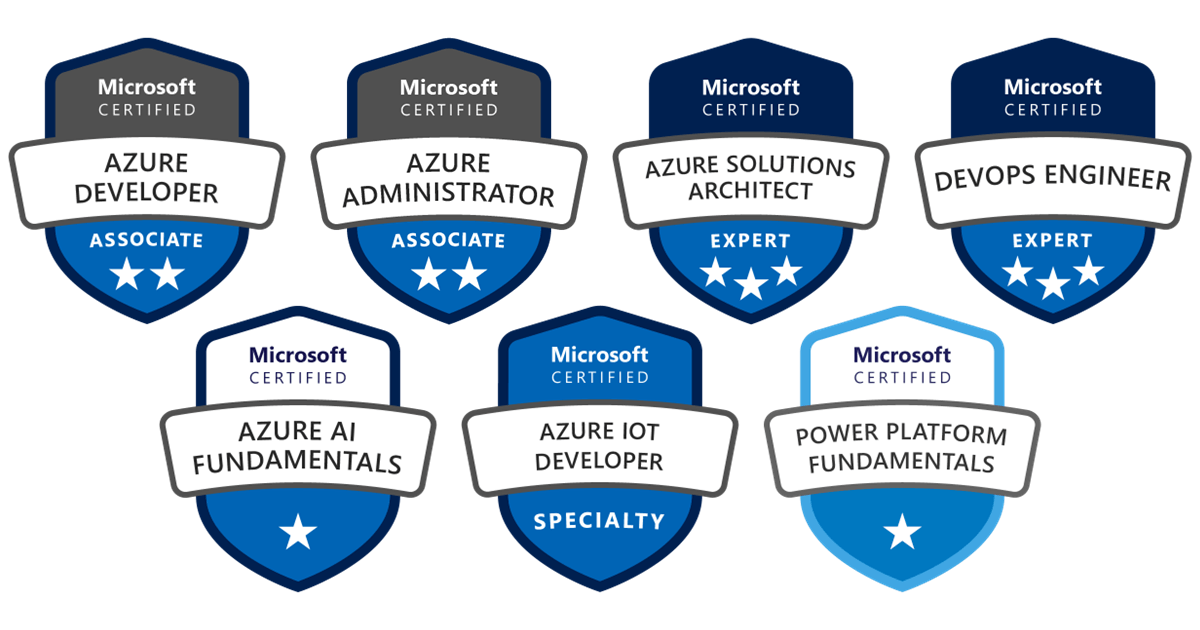
- Introduction to Azure Cloud Career Paths
- Key Roles in Azure Cloud (Administrator, Developer, Architect
- Azure Certifications and How to Choose
- Building Hands-on Experience in Azure
- Job Opportunities in Azure Cloud
- Career Growth and Trends in Azure
- Conclusion
Building a career in Azure Cloud offers numerous opportunities as businesses increasingly adopt cloud technologies. Azure provides a wide range of roles, from cloud architects and developers to security engineers and data scientists. Obtaining certifications like Azure Fundamentals, Azure Solutions Architect, and Azure DevOps Engineer can significantly enhance your expertise and career prospects, especially when combined with Microsoft Azure Training. Staying updated on trends such as serverless computing, AI integration, and hybrid cloud solutions will help you stay competitive in this rapidly evolving field. This guide explores the key roles, essential certifications, and emerging trends to help you build a successful career in Azure Cloud.
Interested in Obtaining Your Azure Certificate? View The Azure Training Offered By ACTE Right Now!
Introduction to Azure Cloud Career Paths
Azure, Microsoft’s cloud computing platform, offers a range of services and solutions that cater to different aspects of cloud computing, from infrastructure to applications, data analytics, and AI. As more organizations transition to the cloud, Azure has become a critical player in the market, and this has led to a significant demand for professionals with Azure expertise. A career in Azure cloud computing offers numerous opportunities for growth, with roles that span across various domains like development, administration, architecture, and security, all of which are supported by a deep understanding of Cloud Computing Platforms and Services. The flexibility and scalability offered by Azure create diverse career paths, whether you are interested in building cloud-based applications, managing and securing infrastructure, or architecting large-scale enterprise solutions. Azure cloud careers also offer the potential to work in a variety of industries, including healthcare, finance, retail, and technology. As organizations continue to adopt cloud-first strategies, the demand for skilled Azure professionals is expected to grow, making it an ideal time to build a career in this field.
Key Roles in Azure Cloud (Administrator, Developer, Architect)
Azure offers a variety of career roles, each focusing on different aspects of cloud computing. Some of the key roles include:
- Azure Administrator: Azure administrators are responsible for managing and maintaining Azure resources, ensuring they are properly configured and optimized. Key duties include managing virtual machines, networks, storage, identity management, and monitoring. They work closely with other teams to ensure smooth operations in a cloud environment. Azure administrators typically have expertise in networking, security, and automation.
- Azure Developer: Azure developers build and deploy cloud-based applications and services on the Azure platform. They are responsible for writing code, integrating APIs, and using various Azure services such as Azure Functions, Azure App Service, and Azure Kubernetes Service to create scalable and reliable applications. Developers also collaborate with other roles to ensure that applications are optimized for the cloud and meet the required performance, scalability, and security standards.
- Azure Architect: Azure architects are responsible for designing and overseeing the deployment of complex, enterprise-scale cloud solutions, often utilizing tools like Ansible, Kubernetes, and Docker for automation, containerization, and orchestration. They work with stakeholders to understand business requirements and create solutions using Azure’s wide range of services. Architects ensure that the system design is cost-efficient, scalable, secure, and high-performing. They also help organizations with cloud migration strategies and best practices for managing large-scale applications in the cloud.
- Azure DevOps Engineer: Azure DevOps engineers focus on automating and streamlining the software development lifecycle (SDLC) using Azure DevOps tools and services. They implement continuous integration (CI) and continuous deployment (CD) pipelines, manage infrastructure as code (IaC), and ensure smooth collaboration between development and operations teams. DevOps engineers work to optimize the deployment process, improve system reliability, and enhance application performance in the cloud.
- Azure Security Engineer:Azure security engineers are responsible for implementing and managing security measures to protect cloud environments and data. They focus on securing Azure resources, configuring identity and access management, and ensuring that networks and applications are compliant with security standards. Security engineers use Azure’s built-in security services, such as Azure Security Center and Azure Sentinel, to monitor threats and vulnerabilities, helping to safeguard the organization’s assets in the cloud.
Each of these roles requires specific skill sets and expertise in different Azure services. Depending on your interest and expertise, you can choose to specialize in one of these roles or explore hybrid roles that blend multiple aspects of cloud computing.
Are You Interested in Learning More About Azure? Sign Up For Our Azure Training Today!
Azure Certifications and How to Choose
Azure certifications validate your knowledge and skills in using the Azure platform and demonstrate your ability to implement and manage cloud solutions effectively. Microsoft offers a variety of Azure certifications, each designed for specific roles, including administrator, developer, architect, and security expert. Choosing the right certification depends on your career goals and current skill set. This entry-level certification is ideal for beginners who want to get a foundational understanding of Azure services and cloud concepts, including Azure Front Door Web Traffic Management for optimizing global web traffic. It covers topics such as cloud computing, Azure pricing, and core Azure services. For those pursuing an Azure administrator role, this certification demonstrates your ability to manage Azure resources, configure networks, implement security policies, and monitor cloud environments. This certification is designed for developers who want to prove their skills in building applications and services on Azure.

It covers topics like developing for the cloud, integrating Azure services, and implementing cloud security. This advanced certification is for professionals aiming to become cloud architects. It covers designing and implementing solutions on Azure, including networking, storage, compute, and security. For those focusing on security, this certification validates your ability to secure Azure resources, implement identity management, and protect data and networks in the cloud. When choosing an Azure certification, consider your current expertise and the career path you wish to pursue. For beginners, starting with the Azure Fundamentals certification is a good foundation. As you gain more experience, you can pursue specialized certifications based on your chosen role.
Building Hands-on Experience in Azure
Building hands-on experience is essential for gaining practical skills and mastering Azure technologies. While certifications provide valuable theoretical knowledge, practical experience ensures you can apply that knowledge to real-world scenarios.
Here are some ways to gain hands-on experience in Azure:
- Azure Free Account: Microsoft offers a free Azure account with $200 in credits to use on Azure services for the first 30 days. After that, the free account allows you to access a limited set of Azure services at no cost. This is an excellent way to explore Azure and gain experience by working on various services such as virtual machines, storage, and databases.
- Online Labs and Training Platforms: Platforms like Microsoft Learn, Pluralsight, and A Cloud Guru offer interactive labs where you can work on real-world Azure scenarios. These labs often provide step-by-step instructions to help you build and manage cloud resources. Additionally, you can take advantage of hands-on labs during certification training to reinforce your learning.
- Personal Projects: Building personal projects on Azure allows you to experiment with different services, practice your skills, and build a portfolio. You can create cloud-based applications, deploy virtual machines, or set up databases on Azure to gain experience in different aspects of the platform.
- Contribute to Open-Source Projects: Contributing to open-source projects that use Azure can help you collaborate with others and gain experience in real-world cloud environments, which can be enhanced through Microsoft Azure Training. You can find projects on GitHub or other open-source platforms that focus on Azure-based solutions.
- Internships and Work Experience: If possible, secure internships or part-time roles that allow you to work with Azure in a professional setting. Hands-on experience in a live cloud environment will give you practical exposure to the challenges and best practices of managing Azure services.
- Azure Hackathons and Competitions: Participating in hackathons or cloud competitions focused on Azure provides a unique opportunity to solve real-world problems using Azure services. These events allow you to collaborate with other participants, gain feedback from industry experts, and build practical solutions under time constraints, enhancing your Azure skills and knowledge. Many organizations and cloud communities host such events regularly, offering prizes, recognition, and networking opportunities.
- Cloud Sandbox Environments: Some cloud service providers, including Azure, offer sandbox environments that allow you to explore and experiment with Azure services in a risk-free manner. These environments are designed to provide a safe space where you can test out configurations, learn new features, and simulate cloud deployments without impacting production environments. You can access these sandboxes through learning platforms or specialized Azure programs aimed at learners and professionals looking to expand their practical experience.
Looking to Master Cloud Computing? Discover the Cloud Computing Masters Course Available at ACTE Now!
Job Opportunities in Azure Cloud
The demand for Azure professionals is growing rapidly as more companies embrace cloud computing and migrate to Azure. With a wide range of roles available, there are numerous job opportunities in the Azure ecosystem. Cloud engineers are responsible for deploying, managing, and maintaining cloud infrastructure on Azure. They work on tasks such as provisioning virtual machines, configuring networks, and managing storage resources, while also ensuring security by managing access through Essential Aspects of AWS IAM. DevOps engineers work on automating and optimizing the software development lifecycle (SDLC) using Azure DevOps tools. They focus on continuous integration and continuous deployment (CI/CD), infrastructure as code (IaC), and ensuring the seamless collaboration between development and operations teams. Architects design complex, scalable, and secure solutions on Azure.

They work closely with business leaders to understand requirements and translate them into cloud solutions. Azure architects are involved in solution design, cost management, migration strategies, and ensuring best practices. Data engineers design and implement data solutions on Azure. They work with tools such as Azure Data Factory, Azure SQL Database, and Azure Synapse Analytics to create data pipelines, manage data storage, and optimize performance. Security engineers focus on protecting Azure environments and data. They are responsible for implementing security controls, monitoring security events, and ensuring compliance with industry standards and regulations. Developers focus on building, deploying, and maintaining applications on Azure. They work with Azure services like Azure Functions, App Service, and Azure Kubernetes Service to create scalable and efficient applications. Azure job opportunities span various industries, including healthcare, finance, e-commerce, and technology. As the cloud continues to grow, the demand for skilled Azure professionals will continue to rise.
Career Growth and Trends in Azure
Azure is continually evolving, and career growth in this field is driven by emerging technologies and trends. Professionals who stay updated with the latest advancements in cloud computing and Azure services will find ample opportunities for career progression.
Some of the key trends driving career growth in Azure include:
- Hybrid and Multi-cloud Solutions: As more organizations adopt hybrid cloud architectures, professionals with expertise in integrating Azure with on-premises environments and other cloud platforms (such as AWS and Google Cloud) will be in high demand.
- AI and Machine Learning: With the rise of AI and machine learning, Azure is integrating these technologies into its cloud offerings. Professionals with expertise in Azure AI and machine learning services will be well-positioned for roles in data science, AI development, and machine learning engineering.
- Serverless Computing: Serverless computing is gaining popularity for building scalable applications without managing infrastructure. Azure Functions and other serverless services provide opportunities for developers to build cost-efficient, event-driven applications.
- Edge Computing: Edge computing, which brings computation closer to data sources, is becoming more important in industries such as IoT and autonomous systems, and can be effectively managed with tools like Getting Started with AWS OpsWorks. Azure’s IoT Edge platform allows businesses to run applications at the edge of their networks, creating new opportunities for cloud engineers and developers.
- Cloud-Native Application Development: As businesses continue to move to the cloud, cloud-native application development is becoming more prominent. Azure provides a comprehensive suite of tools and services to build, deploy, and manage cloud-native applications using microservices, containers, and Kubernetes. Professionals with expertise in these technologies, particularly Azure Kubernetes Service (AKS) and Azure Container Instances, will be highly sought after as organizations focus on building scalable and resilient cloud applications.
- Azure Automation and DevOps: Automation and DevOps practices are transforming how organizations develop, deploy, and maintain applications. With Azure DevOps and tools like Azure Pipelines, professionals skilled in CI/CD pipelines, infrastructure as code (IaC), and automated testing will be crucial for driving efficiency and agility in cloud-based environments. As automation becomes more critical for faster delivery of software, experts in Azure DevOps will play a key role in supporting organizations’ digital transformation efforts.
- Azure Governance and Compliance: With increasing regulatory requirements and security concerns, professionals with expertise in cloud governance, compliance, and security will continue to be in demand.
As Azure continues to evolve, professionals who stay current with new features and services, build hands-on experience, and pursue relevant certifications will find themselves well-positioned for career growth in this dynamic and expanding field.
Want to Learn About Azure? Explore Our Azure Interview Questions And Answers Featuring the Most Frequently Asked Questions in Job Interviews.
Conclusion
A career in Azure cloud computing offers exciting opportunities for growth and specialization across a variety of roles, including administrator, developer, architect, and security engineer. With the cloud market continuously expanding, there is a growing demand for skilled professionals who can manage, secure, and optimize cloud environments. Microsoft Azure Training and hands-on experience are key to building a successful career in this field, providing both foundational knowledge and practical expertise. As organizations increasingly adopt hybrid, multi-cloud, and AI-driven solutions, professionals who stay updated with emerging trends and Azure innovations will be well-positioned for long-term career success. By gaining hands-on experience, pursuing relevant certifications, and aligning with industry trends, individuals can maximize their potential in the Azure ecosystem and contribute to shaping the future of cloud computing.





